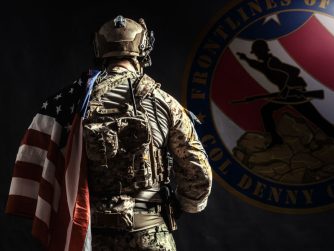After the 9-11 attacks, there was total consensus among Americans, that our nation would never again ignore rising threats in distant lands and allow terrorist groups to gain sanctuary as happened in Afghanistan. Over a dozen years ago, nine days after the World Trade Center towers fell, President George W Bush told a joint session of Congress: “The only way to defeat terrorism as a threat to our way of life is to stop it, eliminate it, and destroy it where it grows.” Lawmakers burst into applause; Bush was 100% right.
Now the black flag of al-Qaida flies in Fallujah; the group and its offshoots are spreading across the Mideast and Africa, and their fighters are battling for control of cities in Iraq, Syria, Lebanon and beyond. “Harbor no illusions: Al-Qaida is not on its heels or even on the run,” said my friend Mike Rogers, a Michigan Republican who chairs the House Intelligence Committee. “Their operations in Iraq, Syria, Pakistan and large portions of Africa indicate that al-Qaida is alive and well,” Rogers said. “The group and its affiliates continue to metastasize, establishing new safe havens from which to attack us and our interests around the world. Now is the time to redouble our efforts to defeat this enemy.” He, too, is 100% right, but it might not be doable just now.
Spending constraints, questionable outcomes of the long wars in Iraq and Afghanistan and anti-democratic backlashes across the Middle East have left our leaders uncertain of how to counter a new wave of Islamist extremism. After nearly 6,600 American deaths in Iraq and Afghanistan, at a cost of more than $2 trillion there and in the broader “war on terror,” the US lacks the money, the policy know-how, and the political will to respond aggressively.
Our combat troops have left Iraq and are leaving Afghanistan.
When President Obama tried to rally support last September for a (to me, counterproductive and totally unnecessary) military strike against Syria — even with a promise of no American boots on the ground — his appeals fell flat.
Jeremiah Pam served in our Embassy in Baghdad during the height of the Iraq War. He later completed major governance assessments in Iraq and Afghanistan for our leadership in the two countries. Pam said the current unwillingness of American political leaders to respond forcefully to the al-Qaida comeback reflects doubt among counterinsurgency experts–this after the failure of massive military operations in Iraq and Afghanistan to create long-term stability. This is reasonable; the way to win a war is to name the enemy and go after them until they surrender—we’ve not even tried to do that.
Stephen Long, a national security professor at the University of Richmond, said that under the pressure of rapidly changing and unforeseen events unleashed by the Arab Spring, Obama is moving away from Bush’s pledges to support democracy and oppose tyranny around the globe. We’re not likely to see blossoming democracies in Afghanistan or Iraq anytime soon, so we’re backed into a corner where we’ve had to exchange stability for democratization.
From Iraq and Afghanistan to Egypt, Syria, Saudi Arabia, and Pakistan, the US now supports autocratic governments in a manner identical to the Cold War stance of backing anti-communist despots. Then, the overriding goal was to prevent the advance of Soviet influence; today, the mission is to stop the spread of al-Qaida-style terrorism.
The Obama administration is shipping Hellfire missiles and providing intelligence, training and logistics to Iraqi Prime Minister al-Maliki, who American analysts say is helping to fuel the al-Qaida resurgence through repressive measures against Sunni Muslims from his Shiite Muslim-dominated government. And he won’t offer us permanent bases there.
The primary causes of Iraq’s current violence are not extremist movements or sectarian and ethnic divisions, but its failed politics and system of governance. These failures are led by the current Maliki government.
Afghan President Hamid Karzai has reneged on promises to sign an accord that would enable some 10,000 US troops to remain in his country as a safeguard against al-Qaida’s growth there and in neighboring Pakistan.
In Egypt, our administration is working with Gen. el-Sissi seven months after he joined a military coup that deposed the democratically elected government—which quickly switched to a dictatorship. This government was led by the Muslim Brotherhood, which el-Sissi has since very accurately branded a terrorist group.
“I must reluctantly conclude that of the possible outcomes, Assad winning the Syrian civil war is not the worst one,” said retired Gen. Michael Hayden, who was Bush’s CIA director—and he’s right. Hayden described a nightmare possible scenario in which al-Qaida-linked warriors control a 400-mile swath of territory stretching westward from Fallujah and Ramadi, near Baghdad, across Iraq and into Syria. “The Syrian revolution has been hijacked by Islamist extremists, by al-Qaida,” he said. “They’ve come the controlling element in the opposition. Left unchecked, what we could end up with is a pre-9/11 Afghanistan-like state comprised of Iraq’s Anbar province and the eastern Syrian desert. But unlike Afghanistan, not in the middle of nowhere but in the middle of the Mideast and 100 or 150 miles from major urban centers: Damascus, Beirut, and Jerusalem.”
Gen. Ray Odierno, the Army chief of staff, is rightfully concerned lest today’s local threats in Iraq and Syria become tomorrow’s broader dangers to the US. The biggest threat to our national security is if this ungoverned territory becomes areas where terrorist organizations become dominant and then export their terrorism outside of the Middle East and into several other countries, including the US.
Folks, the Mideast is a disaster; some of this is caused by our foolish policy about fighting over there when we won’t name an enemy. The world is a very, very dangerous place now—and we’re disarming. We need some real leaders in Washington. First, get involved politically. And, pray for America.



